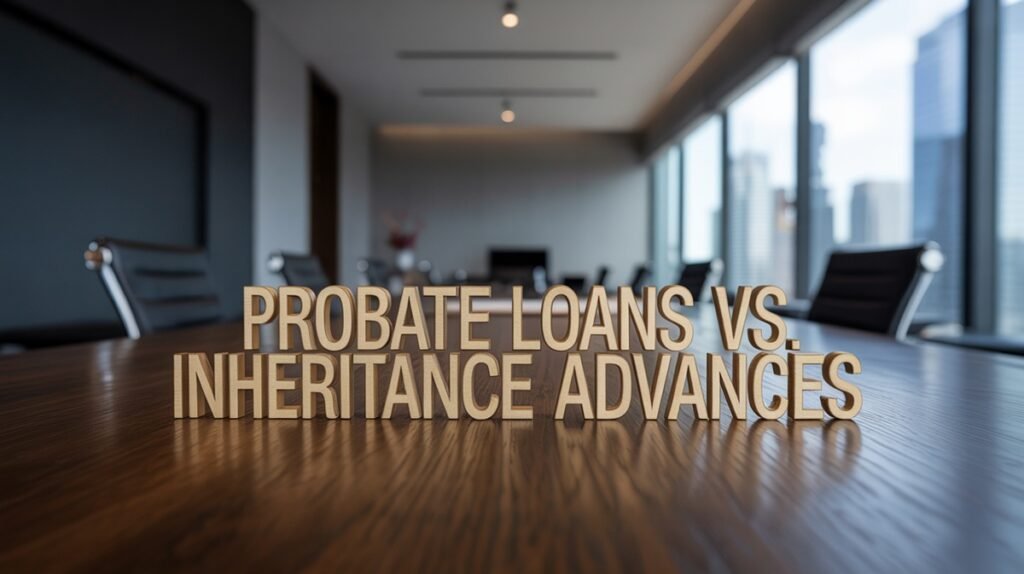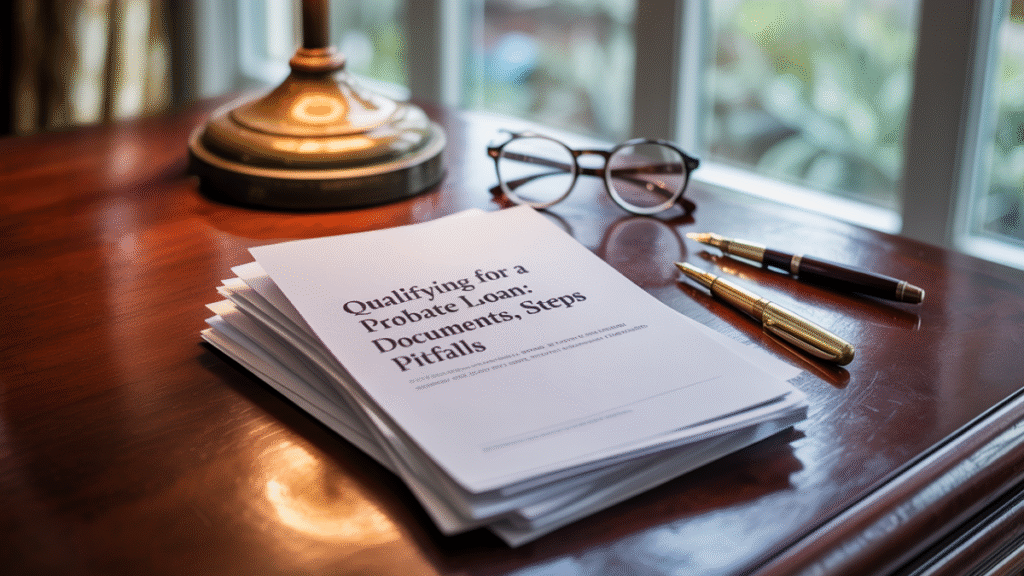| Feature | Probate Loan | Traditional Loan |
| Based on Inheritance | Yes | No |
| Credit Check Required | No | Yes |
| Monthly Payments | No | Yes |
| Collateral Needed | No | Often Yes |
| Repayment Source | From inheritance | From borrower’s income |
| Approval Time | 5–15 business days | Varies—can be longer |
| Fees | High (flat or percentage of inheritance) | Depends on lender and interest rate |
| Risk to Personal Assets | None | Yes (if loan isn’t repaid) |
| Available to Executors | Only if they’re beneficiaries | Yes |
💰 Probate Isn’t Free
Court costs, appraisals, attorney fees — they add up fast.
Estimate your total out-of-pocket costs before you get surprised.
→ Calculate Your Probate Fees
What Is a Probate Loan?
- Definition: A probate loan, also known as an inheritance advance or estate loan, lets heirs access part of their inheritance before the estate officially closes in court.
- How it works: Instead of borrowing against credit or income, you’re getting money based on your expected share of the estate.
- Repayment method: Once the estate is finalized, the lender is repaid directly from your inheritance—no monthly payments, and no interest in the traditional sense, though fees are applied upfront.
It’s a way to speed up access to money that’s otherwise tied up in legal red tape, but it comes at a cost.
What Does an Executor Actually Do?
- Main duties: The executor handles all legal and financial responsibilities tied to the deceased’s estate.
- Tasks involved: These include filing the will with the court, notifying heirs and creditors, managing estate property, paying off debts, and distributing assets.
- Limitations: Executors manage the estate—they don’t own it. Unless named as a beneficiary, they can’t use estate assets for themselves.
So while executors play a big role, they can’t use their authority to take out loans unless they’re inheriting something themselves.
Can an Executor Get a Probate Loan?
- Eligibility condition: An executor can only get a probate loan if they’re also a named beneficiary of the estate.
- Not automatic: Just having the title of executor doesn’t give someone the right to borrow against the estate’s value.
Key takeaway: Executors can only apply for a probate loan if they’re set to inherit a portion of the estate. Authority alone isn’t enough.
What You Need to Qualify for a Probate Loan
- Proof of inheritance: You’ll need to show you’re legally entitled to receive part of the estate. This usually means submitting the will and probate documents.
- Court filings: Most lenders require the probate case number and legal paperwork proving the estate is in court.
- Asset value: The estate needs to have enough value to back the loan—cash, property, or other assets.
- Disputes or contested wills: If someone is challenging the will, it may delay or block the loan process.
- Other heirs: Some lenders may ask for consent from co-beneficiaries, especially if the estate isn’t clearly divided.
Being eligible means more than just inheriting. The estate’s value and legal status also play a role.
How the Probate Loan Process Works
- Reach out to a probate loan provider with basic details about your inheritance.
- Submit required paperwork, including the death certificate, the will, probate filings, and identification.
- The lender verifies your heir status and estimates your share of the estate.
- If approved, the lender makes an offer—typically 30% to 70% of your expected inheritance.
- Once you sign the agreement, the money is deposited—usually within a week or two.
When the estate closes, the lender takes repayment directly from your share. Your credit score isn’t part of the process, and you don’t have to worry about making monthly payments.
Why Someone Might Want a Probate Loan
- Speed: Probate can take months or years. A loan gives you access to funds much faster.
- No credit check: Since the loan is based on inheritance value, your credit doesn’t matter.
- No monthly payments: Repayment comes from the estate later, not from your bank account now.
- Emergency expenses: You can use the money for medical bills, home repairs, or other urgent needs.
- Avoid selling personal assets: Rather than liquidate your own belongings, you tap into future funds.
Probate loans aren’t for everyone, but they can help when you need money before the court finishes the process.
Things to Watch Out For
- High fees: Probate loans usually include significant fees, sometimes up to 40% of the advanced amount.
- Reduced inheritance: You’ll end up receiving less when the estate is settled.
- Legal complications: If probate gets delayed due to disputes, it might affect repayment or create conflicts.
- Heir conflicts: Other beneficiaries may push back if they think your loan affects the estate’s value.
It’s important to read the fine print and fully understand how the loan will impact your final inheritance.
Other Options Besides Probate Loans
- Waiting: The most cost-effective option is to wait until the estate settles and collect your full inheritance.
- Personal loans: You might qualify for a traditional loan with better terms if you have steady income or assets.
- Home equity line of credit: Homeowners can tap into lower-interest funds using their property.
- Early distributions: In some cases, a probate court may allow early release of inheritance with the right approvals.
- Family or friends: Borrowing from someone close to you could help you avoid high lender fees.
A probate loan isn’t the only option. Exploring alternatives may save you money and reduce legal headaches.
Legal and Tax Things to Keep in Mind
- Talk to a lawyer: Legal guidance is crucial before signing anything, especially when you’re the executor.
- No personal liability: You usually won’t owe anything out of pocket if your inheritance turns out to be less than expected.
- Tax rules vary: Inheritance is generally not taxed at the federal level, but state laws may apply.
- Keep heirs informed: Transparency helps avoid future disputes or legal challenges.
Being cautious and well-informed goes a long way in making sure everything stays legal and fair.
Conclusion
Executors who are also beneficiaries may be eligible for probate loans, but that doesn’t mean they should jump at the opportunity without thinking it through. These loans offer fast access to inheritance money, which can be a relief when expenses are piling up. Still, the fees and reduced payout should make you pause and consider other options first. The key is knowing your rights, reading every document carefully, and talking to a professional who can guide you based on your situation.
Key takeaway: If you’re inheriting from an estate, a probate loan is an option—but only if you’re listed as a beneficiary. Your role as executor doesn’t grant automatic access to the estate’s money.
FAQs
Can I apply for a probate loan if the estate has unpaid debts?
Maybe not. If the estate has debts or claims, lenders might deny your loan or lower the amount based on what remains after those debts are settled.
Will a probate loan affect the other beneficiaries?
It could. Some lenders might ask for the consent of other heirs, especially if the loan impacts how the estate is divided or repaid later on.
Are there any upfront costs to applying for a probate loan?
Generally, no. Most lenders take their fees from your inheritance after the estate is finalized. Still, it’s smart to confirm this before signing.
What happens if the estate value drops during probate?
You’re usually not personally responsible. The lender assumes the risk, and if the estate can’t cover the full amount, they can’t come after your personal assets.
Can I cancel the loan after I sign the agreement?
It depends on the lender’s policies. Some agreements are binding once signed and funded. Make sure you ask about cancellation terms upfront.



